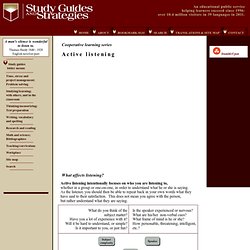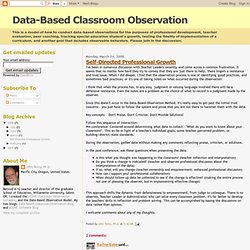

Active Listening - Communication Skills Training from MindTools. Hear What People are Really Saying Learn how to hear the whole message by using active listening techniques.

Listening is one of the most important skills you can have. How well you listen has a major impact on your job effectiveness, and on the quality of your relationships with others. For instance: We listen to obtain information. Given all this listening we do, you would think we'd be good at it! Turn it around and it reveals that when you are receiving directions or being presented with information, you aren't hearing the whole message either. Clearly, listening is a skill that we can all benefit from improving. Tip: Good communication skills require a high level of self-awareness . Active Listening. Cooperative learning series What affects listening?

Active listening intentionally focuses on who you are listening to, whether in a group or one-on-one, in order to understand what he or she is saying. As the listener, you should then be able to repeat back in your own words what they have said to their satisfaction. This does not mean you agree with the person,but rather understand what they are saying. Described above are the external factors. Prepare with a positive, engaged attitude Focus your attention on the subject Stop all non-relevant activities beforehand to orient yourselfto the speaker or the topic Review mentally what you already know about the subject Organize in advance relevant material in order to develop it further (previous lectures, TV programs, newspaper articles, web sites, prior real life experience, etc.)
Actively listen Follow up activities Check if you have understood Continue dialogue: In a group or audiencegive the speaker space to regroup, to debrief after talking. Classroom Observation Tips. I've been in numerous discussion with Teacher Leaders recently, and come across a common frustration.

It seems that no matter how hard they try to convey that they are 'just there to help', there lingers a resistance and trust issue. When I did deeper, I find that the observation process is one of identifying 'good' practices, and sometimes 'bad' practices; or it's one of taking notes on 'what occurred during the observation'. I think that when the process has, in any way, judgment or valuing language involved there will be a defensive resistance. Even the notes are a problem as the choice of what to record is a judgment made by the observer. Since this doesn't occur in the Data-Based Observation Method, it's really easy to get past the initial trust concerns - you just have to follow the system and prove that you are not there to hammer them with the data. Key concepts: Don't Praise, Don't Criticize, Don't Provide Solutions!
Follow this sequence of interaction: DOE - School Administrative Unit Websites. Whole Brain Teaching: The Basics. Behavior Management Software - ClassDojo. Drive: The Surprising Truth About What Motivates Us (9781594484803): Daniel H. Pink. What Research Says abot Using Value-Added Measurements to Evaluate Teachers. Tying Teacher Salaries to Test Scores Doesn't Work. The idea of “pay for performance,” which involves supplementing teacher pay or providing bonuses based on student test scores, is one of the latest educational fads to sweep the country.

Research and experience, however, indicate that such schemes are more likely to damage our children’s education than to improve it. As one analyst notes, “test-based pay is more useful politically than it is effective educationally.” Performance pay will not improve teaching or learning Research shows that the carrot of higher pay does not lead to better results. In an authoritative study conducted at Vanderbilt University, for example, teachers who were offered bonuses for improving student test results produced no more improvement than the control group.
Similar studies of teacher merit pay have shown null results in New York City and Chicago. Methods that use test scores to evaluate teachers, including the currently popular “value added” calculations, have also proved highly unreliable. References. Should Teacher Pay Be Based on Performance. Pros and cons of merit pay for teachers: A point-counterpoint look at the issue from one of the leading practitioners of performance-based compensation. One working model for merit pay or performance-based compensation for teachers is the Teacher Advancement Program (TAP) launched by the Milken Family Foundation in 1999.

A trademark of TAP is that it ties educators’ salaries and bonuses to instructional performance and growth in student achievement. Other features of the model include ongoing professional development as part of the school day, multiple career paths and accountability based on clearly defined, research-based standards. Teacher Merit Pay Pros and Cons – A Comparison To address the controversy around merit pay for teachers, the Milken Family Foundation produced an opinion paper called “The Pros and Cons of Performance-Based Compensation”. The authors, Lewis Solmon and Michael Podgursky, developed a list of 15 common arguments against merit pay or performance-based compensation for educators. “Performance-based compensation will stimulate a market for superior teachers,” write the authors.
The Widget Effect.